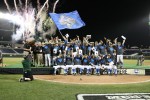In early April, following a 5-2 loss to Oregon State, the UCLA baseball team sat down in the locker room at Jackie Robinson Stadium to discuss the direction of its season.
The Bruins had lost five of their past seven games after jumping out to a 17-4 record to start the season and were looking to get back on course.
They knew their offense was slumping. They knew their effort could be better, that they could achieve more, said sophomore closer David Berg, reflecting on that meeting nearly three months ago.
“We sat in that meeting and looked each other in the eyes and made that commitment to each other that, hey, we have a chance to do something special here.”
The commitment paid off and the Bruins did do something special, something no UCLA baseball team before had accomplished – they won an NCAA title.
UCLA spent its whole season being doubted. It was an underdog in the Super Regionals against Cal State Fullerton before sweeping the Titans. Junior pitcher Adam Plutko said the team had been “flying under the radar” the whole season.
Even as the Bruins scorched through the College World Series en route to the national title, the focus was on their lack of explosive offense and small ball approach rather than the fact that they were winning.
“I can’t say enough about the guys to my right because they’ve earned it and people didn’t believe in them,” said coach John Savage at the postgame press conference after the Bruins’ 8-0 victory to claim the national title, his players sitting on his side.
“People didn’t think they were the best team and I don’t know any reason why you couldn’t think that. We lost 17 games, but we won 49.”
The way in which the Bruins won was the part that captured so much attention.
UCLA, one of the nation’s worst hitting teams statistically, plowed through several of the top offensive teams in the country throughout the postseason. The Bruins held their College World Series opponents to just four total runs and allowed only 14 runs in their 10 playoff games. On top of that, the Bruins showed how clutch they were, with all but two of the games decided by three runs or fewer.
With so many close games, Berg had plenty of opportunities to add to his saves total, and he finished the season having set a new NCAA single-season record.“We play a lot of tight games. We aren’t explosive offensively but we win a lot of games because we do execute,” Berg said. “(The record is) in my name, but it’s a team deal because I wouldn’t be here without the guys to my left.”
While UCLA may not have had the same level of individual star power on offense as its opponents in the postseason, its commitment to team play proved to be the more successful formula.
The Bruins scrapped together runs, pouncing on opponents’ mistakes and relying on timely hitting from all over the lineup.
“Really it’s preparation, and I mean, one through nine we could all execute,” said sophomore right fielder Eric Filia.
The preparation, the dedication in practice, the commitment to the little things, like cleaning the team bus – these are what Filia believes made UCLA the national championship team it became.
That hard work is what proved the doubters wrong and why the Bruins, even during their shaky moments throughout the season, were confident they had what it would take to make it as far as they did.
“We believed we were the best team in the country from the get‑go, the fall practices, 6 a.m. weights, conditioning after practice,” said senior second baseman Cody Regis.
“We had that mindset we weren’t going to stop until July 1. That’s what Coach always said. ‘Season ends July 1 when the tournament is over.’ And I think we are here because we believed throughout the process.”
